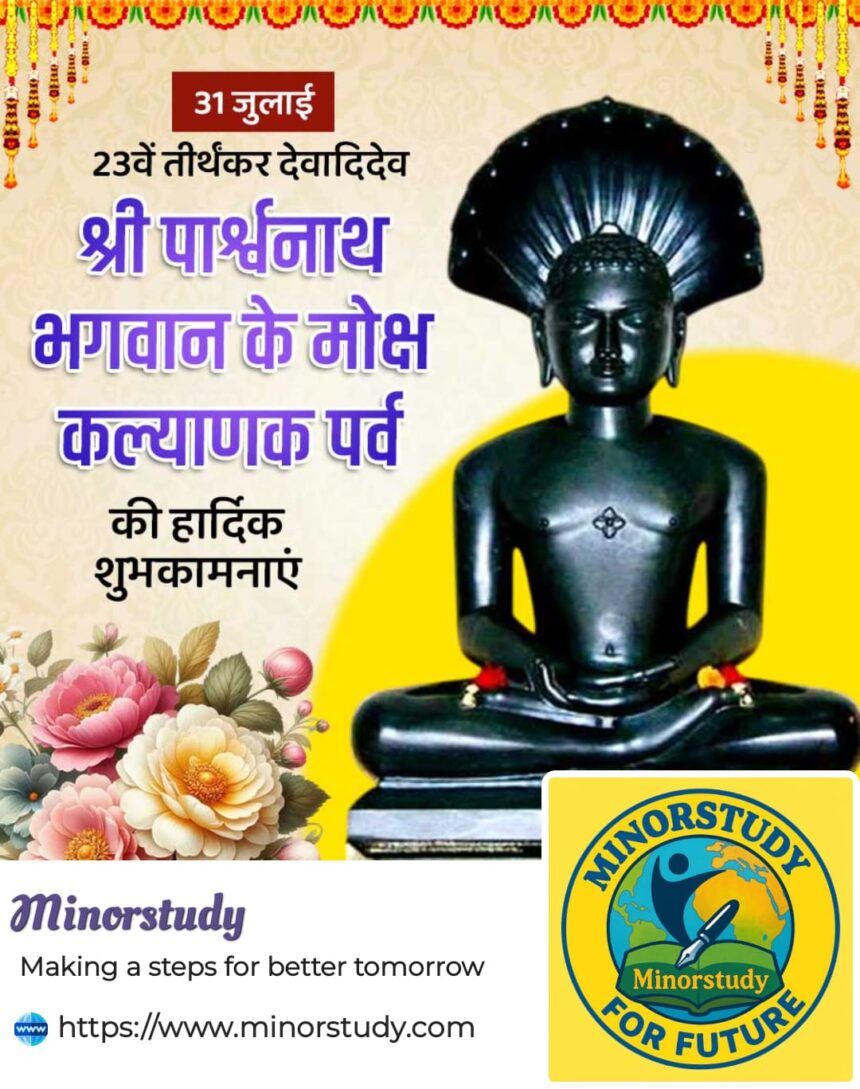Profound Truths Behind Sri Parshvanath Moksha That Inspire a Peaceful Life
🪷 Introduction: Who is Sri Parshvanath?
Sri Parshvanath Moksha: Sri Parshvanath is the 23rd Tirthankara in Jainism—a spiritual teacher who has conquered the cycle of birth and death. Revered by millions of Jains across the world, Parshvanath Bhagwan is a symbol of compassion, non-violence, renunciation, and self-discipline.
- 🕉️ What is Moksha Kalyanak?
- 📜 History of Sri Parshvanath’s Moksha
- 🪔 7 Profound Facts About Parshvanath’s Moksha
- 📅 Timeline of Sri Parshvanath’s Life and Kalyanaks
- 📖 Rituals & Observances on Parshvanath Moksha Kalyanak
- 🙏 Significance of Moksha Kalyanak of Sri Parshvanath
- ❓ Frequently Asked Questions (FAQs)
- 🧘♀️ Daily Life Impact and Relevance
- 🪷 Important Lessons from Parshvanath’s Life
- 💐 Heartfelt Wishing on Parshvanath Moksha Kalyanak
- 🏛️ Importance in Society
- 🧾 Conclusion: The Path to Eternal Peace
He attained Moksha (liberation) on Shravan Krishna Ekadashi at Sammed Shikharji, one of the holiest pilgrimage sites for Jains. The day of his liberation is celebrated with deep reverence and is known as Moksha Kalyanak Mahotsav.
🕉️ What is Moksha Kalyanak?
In Jain tradition, Kalyanaks are the five auspicious life events in a Tirthankara’s life:
Chyavan (Conception)
Janm (Birth)
Diksha (Renunciation)
Kevalgyan (Omniscience)
Moksha (Liberation)
Among these, Moksha Kalyanak is the final, most divine, and spiritually significant event, marking the Tirthankara’s liberation from all karmic bondage and their entry into Siddha Shila—a state of eternal bliss and omnipresence.
📜 History of Sri Parshvanath’s Moksha
Born around 877 BCE in Varanasi, Uttar Pradesh, into a royal family.
Son of King Ashvasen and Queen Vamadevi.
At age 30, he renounced worldly life and became an ascetic.
Meditated and practiced penance for over 84 days to attain Kevalgyan (perfect knowledge).
Preached the path of Ahimsa (non-violence), Aparigraha (non-possessiveness), Satya (truth), and Achaurya (non-stealing).
Finally, at the age of 100 years, he attained Moksha at Sammed Shikharji, Jharkhand—on the 11th day of the dark half of Shravan month.
🪔 7 Profound Facts About Parshvanath’s Moksha
First Historical Tirthankara: Parshvanath is the earliest Tirthankara whose existence is historically validated.
Follower Count: He had thousands of disciples, including Maa Padmavati and Dharnendra Dev, who often assist devotees.
Introduced 4 Great Vows: He laid the foundation for core Jain principles, later expanded by Mahavira.
Penance and Peace: Practiced intense penance under storms, aided by serpent king Dharnendra.
No Food on Moksha Day: Followers observe fasting and refrain from violence or indulgence.
Worshipped Widely: His idols are most frequently installed in Jain temples globally.
Sammed Shikharji’s Sanctity: His Moksha site is a pilgrimage center where 20 of 24 Tirthankaras attained liberation.
📅 Timeline of Sri Parshvanath’s Life and Kalyanaks
| Event | Age | Description |
|---|---|---|
| Birth | 0 | Born in Varanasi into royal Ikshvaku dynasty |
| Renunciation | 30 | Left home to pursue spiritual path |
| Kevalgyan | 84 days later | Attained omniscience under a tree |
| Preaching | 70+ years | Spread Jain philosophy peacefully |
| Moksha | 100 | Achieved at Sammed Shikharji, Jharkhand |
📖 Rituals & Observances on Parshvanath Moksha Kalyanak
Early Morning Prabhat Pheri: Devotees walk together singing bhajans.
Snatra Puja: A symbolic cleansing ceremony of the Lord’s idol.
Abhishek & Shantidhara: Sacred rituals of bathing and anointing the idol.
Fast (Upvas): Strict fasting by devotees, often without water.
Samayik & Pratikraman: Deep reflection, repentance, and self-discipline practices.
Bhakti and Jaap: Chanting of ‘Om Rhim Namo Parshvanathaya’ mantra.
Path of Kalpa Sutra and other scriptures: Reciting stories from Jain texts.
Community Feasts (After fasts): Prepared with non-violence and utmost purity.
🙏 Significance of Moksha Kalyanak of Sri Parshvanath
✨ Spiritual
Reminds us of the ultimate goal of Moksha—freedom from the cycle of rebirth.
Inspires us to reduce Karma, attachments, and ego.
Reinforces faith in non-violence, truth, and asceticism.
✨ Personal
Teaches the power of forgiveness, simplicity, and mindfulness.
Encourages detachment from material possessions and living with purpose.
✨ Cultural & Social
Promotes non-violent practices and vegetarianism.
Brings families and communities together for shared rituals and fasting.
Offers mental clarity and a stress-free perspective in a fast-paced world.
❓ Frequently Asked Questions (FAQs)
Q1. What is Moksha in Jainism?
Moksha means liberation from birth-death cycles and karmic bondage, resulting in eternal peace in Siddha Shila.
Q2. Where did Sri Parshvanath attain Moksha?
He attained Moksha at Sammed Shikharji, Jharkhand—a sacred Jain pilgrimage site.
Q3. What makes Sri Parshvanath different from Mahavira?
Parshvanath laid the foundation of 4 vows. Mahavira added the 5th vow (Brahmacharya). Both preached non-violence and self-realization.
Q4. Can non-Jains observe Moksha Kalyanak?
Yes. The spiritual values of truth, peace, and compassion are universal.
Q5. Why is fasting important on this day?
It helps purify the mind and body, aligning one’s energy with the divine vibrations of liberation.
🧘♀️ Daily Life Impact and Relevance
Mindfulness Practice: Inspired by rituals like Samayik, we learn to live in the present.
Mental Peace: Observing Parshvanath’s journey brings perspective in stressful times.
Eco-Living: His principles discourage overconsumption, promoting sustainability.
Universal Non-Violence: Encourages respect for all forms of life.
🪷 Important Lessons from Parshvanath’s Life
Renounce, Reflect, Realize—true happiness lies beyond materialism.
Non-violence is Power—choose peace over harm.
Shed Karma Daily—through meditation, self-discipline, and humility.
Live Lightly—possess little, give more.
Let Go—attachments, grudges, anger, and ego.
Accept the Eternal—Moksha is within everyone’s reach.
Serve Humanity—spirituality is incomplete without compassion.
💐 Heartfelt Wishing on Parshvanath Moksha Kalyanak
“On this sacred occasion of Moksha Kalyanak of Lord Parshvanath,
May your life be filled with peace, clarity, and eternal compassion.
Let go of burdens, and walk the path of light and liberation.
Jai Jinendra!”
🏛️ Importance in Society
A moral compass for younger generations.
Encourages animal rights, vegetarianism, and eco-awareness.
Builds a non-violent society with stronger spiritual ethics.
Acts as a cultural glue, especially for the Jain diaspora.
Strengthens the role of inner transformation over external rituals.
🧾 Conclusion: The Path to Eternal Peace
Sri Parshvanath’s Moksha Kalyanak isn’t just a historical event—it is an awakening. It reminds humanity that liberation is not found in palaces or possessions, but within a heart that is clean, compassionate, and free from attachments.
In a world full of distractions, Lord Parshvanath’s life is a guiding light. Whether you’re Jain or not, his teachings of Ahimsa, Satya, and Aparigraha offer timeless wisdom to lead a calmer, kinder, and more conscious life.
So on this Kalyanak, pause, reflect, and remember:
Liberation is not a destination—it is a way of life.








